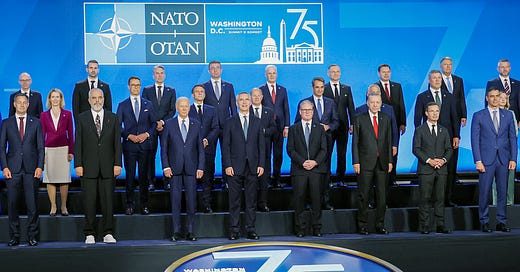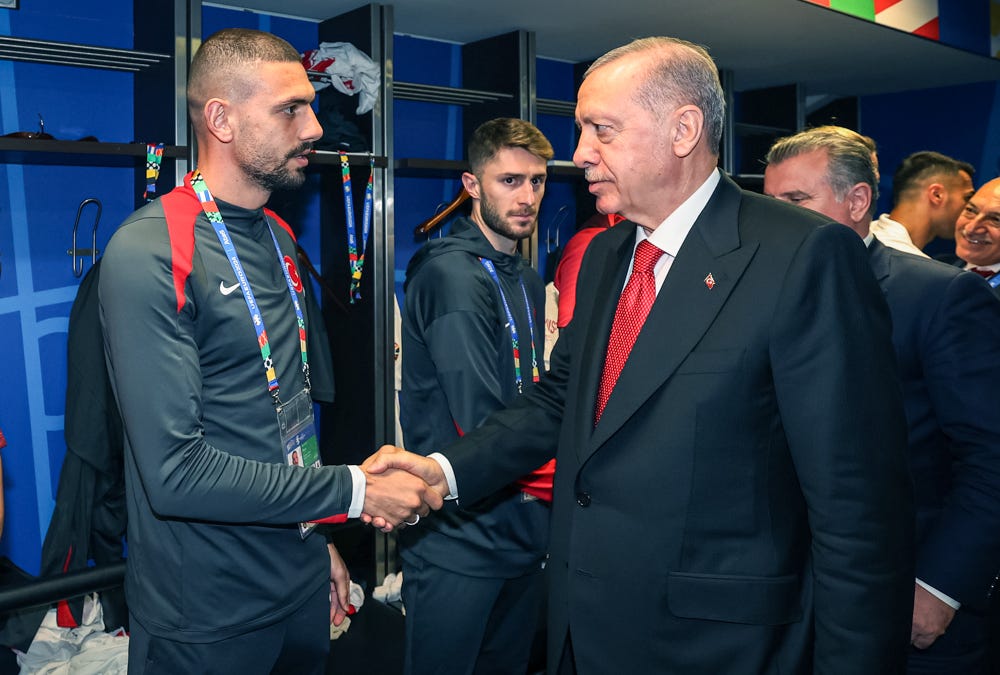Softcore porn or ASMR? Foreign media has contemplated the online phenomenon of lavish male massages in Turkey’s barbershops.
Same question applies to Edirne’s oil wrestling festival.
In this week’s recap:
NATO at 75: The view from Turkey
Turkey loses at EURO after Bozkurt ban
Ateş murder trial on break
Domestic politics wrap
Syrians’ data leaked, Erdoğan seeks Assad meeting
Turkish teen (kind of) beats chess champ
This year, NATO hit the 75-year mark, and Turkey marked 72 years in the alliance. Topping the list of concerns at the Washington summit are the Russia-Ukraine war, China and another Trump presidency.
For Ankara, top concerns are the fight against terrorism “especially in our immediate surroundings” and removing defense industry trade barriers between allies, as Pres. Erdoğan stated Tuesday before departing for the summit.
In the broader context, Turkish officials are attending the event after expressing interest in developing ties with the Shanghai Cooperation Organization and, possibly, BRICS. At the same time, Wednesday’s NATO declaration indicates Turkey will host the 2026 summit and Ankara requested additional air defense systems from the alliance, according to Politico.
The two trend lines suggest Ankara is hedging its bets, analysts told Turkey recap. While public support for NATO grew in Turkey after the 2022 Russian invasion of Ukraine, a fast-evolving geopolitical landscape is prompting Ankara to explore alternatives at a time of low trust with western allies.
Evren Balta, a professor of political science at Özyeğin University, said Turkey maintains institutional – political, economic and military – links to the west “but what has really changed is there's a huge trust issue” between Turkey and NATO allies, she told Turkey recap.
“The deepening of that relationship is a problem right now because … neither side trusts the other,” Balta continued, saying such dynamics have fostered increased transnationalism in bilateral ties.
At the same time, Turkey is trying avoid “putting all its eggs in the same basket”, she said, and maintain flexibility through a period of geopolitical uncertainty – a playbook used by many emerging powers.
“Turkey wants to be part of the Global South and part of the West,” Balta said. “The billion-dollar question [is] whether you can do both.”
Certainly, Erdoğan is not alone in such balancing acts. Recent examples include Narendra Modi’s bear hug with Vladimir Putin and Viktor Orbán’s “peace mission” to Russia and China.
Turkey’s leadership is also not the sole reason for this foreign policy trajectory, as much of the public remains skeptical of the west, especially the US, said Aslı Aydıntaşbaş, a visiting fellow at Brookings.
She told Turkey recap that Ankara’s security concerns, like the “war on terrorism”, are not high priorities among NATO allies in the face of Russian aggression. Conversely, she noted there are still areas for US-Turkey cooperation, particularly in “Central Asia, Africa and the Balkans down the road.”
“There are regions that Turkey can reach, where the US reach is weaker,” Aydıntaşbaş said. "I think, the two sides should seek greater cooperation. It meets Turkey's desire to be a regional player, to be recognized as a more of a global actor. And it also serves US needs to have a partner that can push back against Russian and Chinese [influence].”
But the billion-dollar question remains: Can Turkey work with opposing camps in the case of future trade wars with China or deeper sanctions on Russia? Balta said it’s not a Turkey problem, but a “collective action problem” as India, Brazil and many EU countries would face political and economic dilemmas if forced to choose sides.
These are the ramifications of an emerging multipolar world where the US currently maintains asymmetric military power, but financial power is increasingly dispersed, she said.
“In terms of finance, credit and trade, a lot of different actors are becoming more and more important, specifically China, so in that sense it's a very multipolar world right now,” Balta said. “But we don't know how that world is going to evolve, whether towards more conflict or more cooperation.”
“When we assume conflict, I sometimes think that might be a self-fulfilling prophecy,” she added.
– Diego Cupolo
Gone to the wolfpack: Turkey loses at EURO after Bozkurt ban
Keep reading with a 7-day free trial
Subscribe to Turkey recap to keep reading this post and get 7 days of free access to the full post archives.





